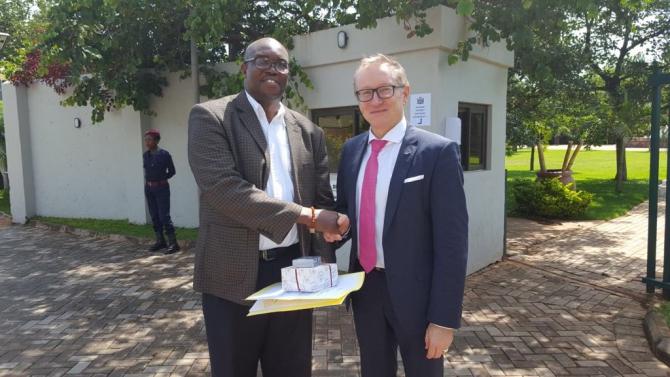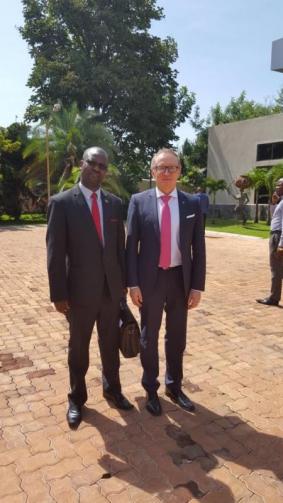Seventh Day Adventist Church Woodlands Conference President, Dr.
- Home
- About Parliament
- Members
- Committees
- Publications
The official opening of the ICT workshop to formulate a new National Assembly ICT Strategic Plan was officially opened by Mr Roy Ngulube, the Deputy Clerk Administration at Twangale Park in Lusaka on Saturday, 17th February, 2018. The event was characterized by a number of speeches.
In his official opening remarks, the Deputy Clerk Administration on behalf of National Assembly warmly welcomed all the participants and extended a special welcome to the facilitators who travelled all the way from Austria to come and share their knowledge and expertise. He further thanked the Parliament of Austria for their continued support and cooperation since the inception of the project. This project is being financed by Austrian Development Agency and the province of Upper Austria. The Deputy Clerk Administration assured the Parliament of Austria that the existing cooperation enhance the realization of the vision of the National Assembly of being a model legislature for democracy and good governance.
Furthermore, he was quick to point out that this cooperation will contribute to the Institution’s campaign of bringing Parliament closer to the people. To this end, Parliament will continue to embrace Parliamentary Reforms, which include use of ICT’s to support the mandate of the Legislature. Additionally, the Deputy Clerk Administration informed the workshop participants that the cooperation between the National Assembly of Zambia and the Parliament of Austria was formalised through the signing of a Memorandum of Understanding in January, 2017, within the framework of the NorthSouthDialogue of Parliaments. The Memorandum of Understanding strives to achieve through its activities an Accessible, Transparent, Open and Modern (ATOM) Parliament.
Speaking at the same function, Dr Martine G Mtonga, Permanent Secretary and National Coordinator – Smart Zambia Institute informed the workshop that the Smart Zambia Institute was established under Government Gazette No. 836 of 2016 as an e-Government Division in the office of the President. The Institute’s mandate is to promote electronic Government services and processes in order to improve service delivery. Dr Mtonga further informed the workshop participants of the specific functions of the Smart Zambia Institute which include; promotion and management of e-Government policies and programmes, development of strategies and standards that enhance usage and application of information and communication technology innovations in the public sector, promotion of inter-government agency collaboration in providing e-government services by integrating related functions and systems and development of supportive and enabling shared infrastructure to ensure equitable access to effective and appropriate information and communication technologies among others. The Permanent Secretary was quick to inform the workshop of some of the guiding principles that enable the institute to effectively perform the aforementioned specific functions. Some of the guiding principles include innovation application of solutions, integrated provision of e-government services, sharing of administrative informative information among public bodies which avoid information duplicity, prudent and responsible use of public resources and prudent and responsible use of public resources in the implementation of the e-Government activities among others.
Mr Michael Mukuka, the Principal Clerk ICT at National Assembly of Zambia informed the meeting that in 2015, the National Assembly of Zambia launched its strategic plan (2015-2019). This document provides the framework in which the institution aims to meet its objectives. The Principal Clerk ICT was able to share with the workshop some of the things that this workshop sought to achieve. Some of the objectives of the workshop include; delivery of an understanding of the aims and goals for the revised ICT strategy, establishment of a structure for the new ICT strategy, creation of a framework for implementation plan of the revised ICT strategy, evaluation, description and elaboration of the services and support of an ICT strategy among others.
The workshop facilitators that travelled from Austria were Peter Reichstaedter, the Head of the ICT Department Austrian Parliament and Ms Jutta Kepplinger, the Project Coordination NorthSouthDialogue of Parliaments.

MR ROY NGULUBE - DEPUTY CLERK (ADMINISTRATION) LEFT AND MR PETER REICHSTAEDTER, HEAD OF ICT PARLIAMENT OF AUSTRIA

DR MARTINE G MTONGA - PERMANENT SECRETARY AND NATIONAL COORDINATOR SMART ZAMBIA INSTITUTE AND PETER REICHSTAEDTER, HEAD OF ICT PARLIAMENT OF AUSTRIA